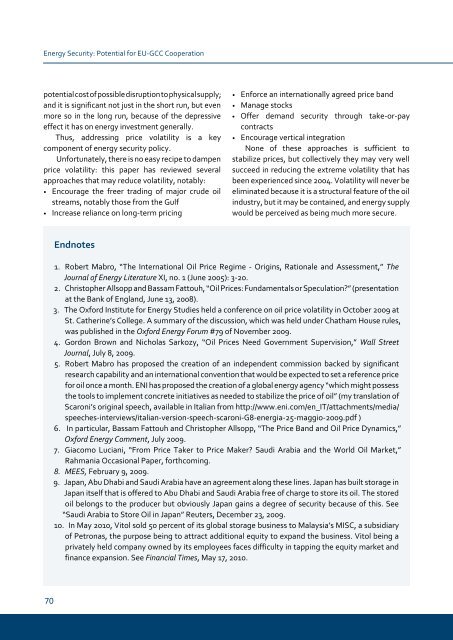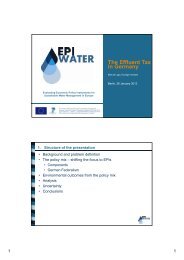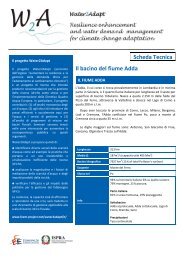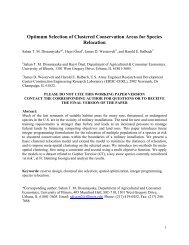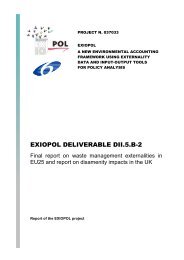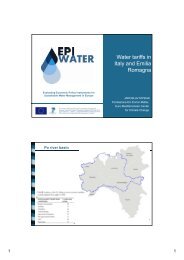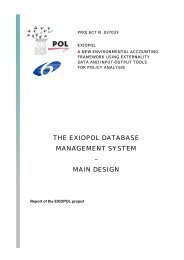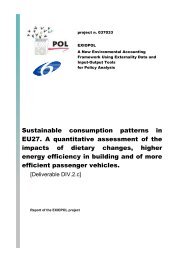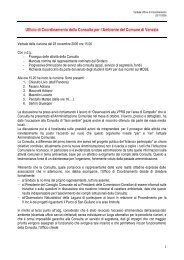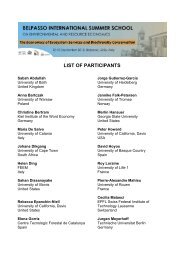Gulf and European Energy Supply Security - Feem-project.net
Gulf and European Energy Supply Security - Feem-project.net
Gulf and European Energy Supply Security - Feem-project.net
You also want an ePaper? Increase the reach of your titles
YUMPU automatically turns print PDFs into web optimized ePapers that Google loves.
<strong>Energy</strong> <strong>Security</strong>: Potential for EU-GCC Cooperation<br />
potential cost of possible disruption to physical supply;<br />
<strong>and</strong> it is significant not just in the short run, but even<br />
more so in the long run, because of the depressive<br />
effect it has on energy investment generally.<br />
Thus, addressing price volatility is a key<br />
component of energy security policy.<br />
Unfortunately, there is no easy recipe to dampen<br />
price volatility: this paper has reviewed several<br />
approaches that may reduce volatility, notably:<br />
• Encourage the freer trading of major crude oil<br />
streams, notably those from the <strong>Gulf</strong><br />
• Increase reliance on long-term pricing<br />
0<br />
endnotes<br />
1.<br />
2.<br />
3.<br />
4.<br />
5.<br />
6.<br />
7.<br />
8.<br />
9.<br />
• Enforce an internationally agreed price b<strong>and</strong><br />
• Manage stocks<br />
• Offer dem<strong>and</strong> security through take-or-pay<br />
contracts<br />
•<br />
Encourage vertical integration<br />
None of these approaches is sufficient to<br />
stabilize prices, but collectively they may very well<br />
succeed in reducing the extreme volatility that has<br />
been experienced since 2004. Volatility will never be<br />
eliminated because it is a structural feature of the oil<br />
industry, but it may be contained, <strong>and</strong> energy supply<br />
would be perceived as being much more secure.<br />
Robert Mabro, “The International Oil Price Regime - Origins, Rationale <strong>and</strong> Assessment,” The<br />
Journal of <strong>Energy</strong> Literature XI, no. 1 (June 2005): 3-20.<br />
Christopher Allsopp <strong>and</strong> Bassam Fattouh, “Oil Prices: Fundamentals or Speculation?” (presentation<br />
at the Bank of Engl<strong>and</strong>, June 13, 2008).<br />
The Oxford Institute for <strong>Energy</strong> Studies held a conference on oil price volatility in October 2009 at<br />
St. Catherine’s College. A summary of the discussion, which was held under Chatham House rules,<br />
was published in the Oxford <strong>Energy</strong> Forum #79 of November 2009.<br />
Gordon Brown <strong>and</strong> Nicholas Sarkozy, “Oil Prices Need Government Supervision,” Wall Street<br />
Journal, July 8, 2009.<br />
Robert Mabro has proposed the creation of an independent commission backed by significant<br />
research capability <strong>and</strong> an international convention that would be expected to set a reference price<br />
for oil once a month. ENI has proposed the creation of a global energy agency “which might possess<br />
the tools to implement concrete initiatives as needed to stabilize the price of oil” (my translation of<br />
Scaroni’s original speech, available in Italian from http://www.eni.com/en_IT/attachments/media/<br />
speeches-interviews/italian-version-speech-scaroni-G8-energia-25-maggio-2009.pdf )<br />
In particular, Bassam Fattouh <strong>and</strong> Christopher Allsopp, “The Price B<strong>and</strong> <strong>and</strong> Oil Price Dynamics,”<br />
Oxford <strong>Energy</strong> Comment, July 2009.<br />
Giacomo Luciani, “From Price Taker to Price Maker? Saudi Arabia <strong>and</strong> the World Oil Market,”<br />
Rahmania Occasional Paper, forthcoming.<br />
MEES, February 9, 2009.<br />
Japan, Abu Dhabi <strong>and</strong> Saudi Arabia have an agreement along these lines. Japan has built storage in<br />
Japan itself that is offered to Abu Dhabi <strong>and</strong> Saudi Arabia free of charge to store its oil. The stored<br />
oil belongs to the producer but obviously Japan gains a degree of security because of this. See<br />
“Saudi Arabia to Store Oil in Japan” Reuters, December 23, 2009.<br />
10. In May 2010, Vitol sold 50 percent of its global storage business to Malaysia’s MISC, a subsidiary<br />
of Petronas, the purpose being to attract additional equity to exp<strong>and</strong> the business. Vitol being a<br />
privately held company owned by its employees faces difficulty in tapping the equity market <strong>and</strong><br />
finance expansion. See Financial Times, May 17, 2010.


